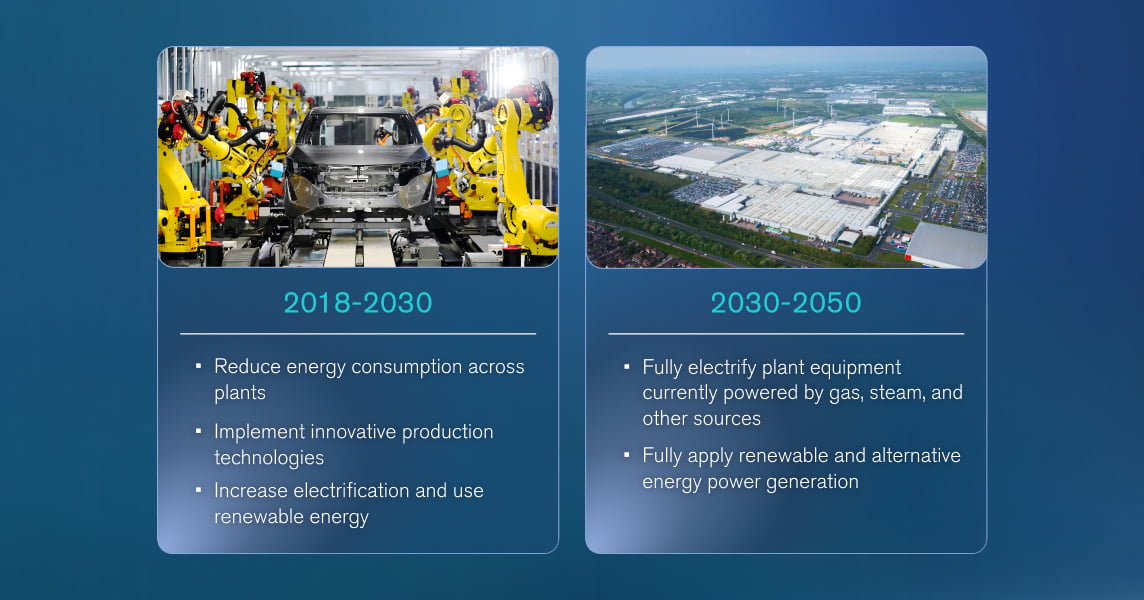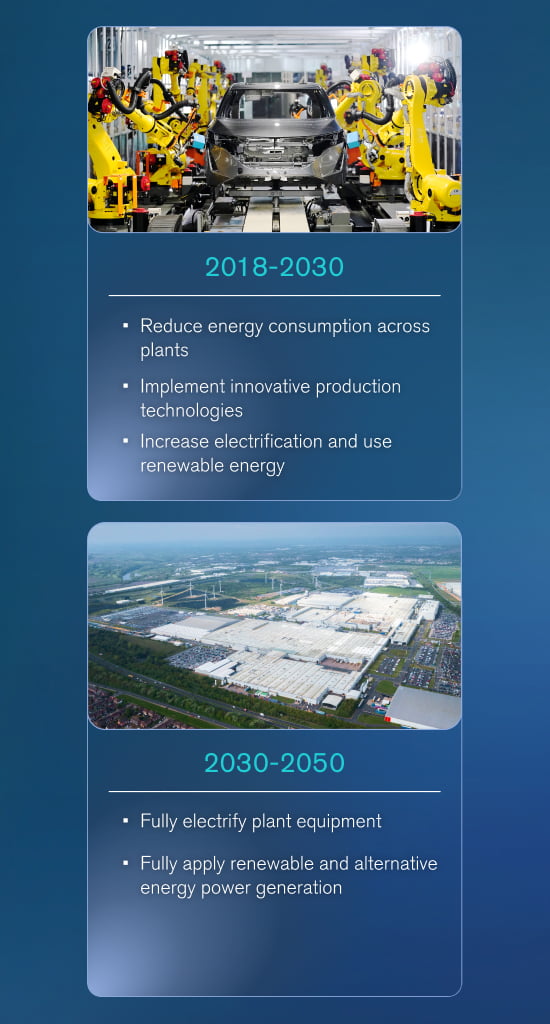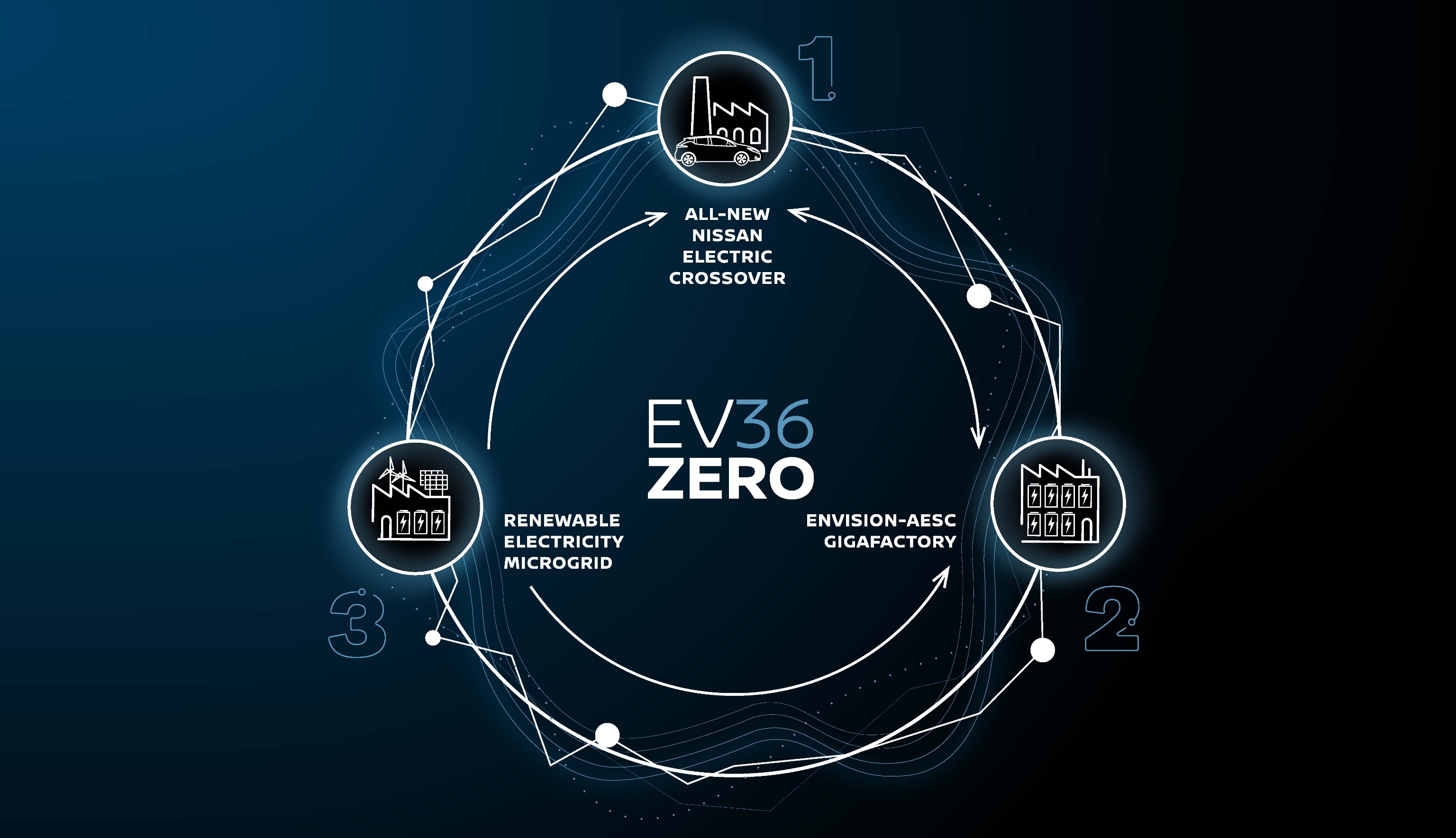Climate Change


Nissan aims to achieve carbon neutrality by 2050 across its operations and vehicle lifecycles to help combat climate change. This goal is driven by advancements in electrification and manufacturing technologies.
NGP2030 Objectives

Lifecycle
- Reduce 30% CO2 globally from Lifecycle of products

Products
- Reduce 50% CO2 in 4 major regions (Japan, US, Europe, China)
- Reduce 32.5% CO2 globally

Manufacturing
- Reduce 52% globally from manufacturing sites
Our Approach
The business structures of the automobile industry are changing greatly in the face of demand to reduce CO2 emissions and dependence on fossil fuels. As a global automaker, Nissan takes into account the reduction of CO2 emissions through the whole value chain, including suppliers, from the procurement of raw materials to the disposal of vehicles. Understanding the importance of balancing efforts in this area with business activities, we are striving to reduce CO2 emissions through initiatives such as developing new technologies and using renewable energy.
Nissan is actively working on reducing CO2 emissions across the entire lifecycle of its vehicles. We are promoting the development of new technologies and the introduction of renewable energy in the entire value chain, including suppliers, to achieve CO2 reduction at every stage, from raw material extraction to manufacturing, transportation, product use, and disposal.

Approach to reduce CO2 emissions through corporate activity
| Energy saving | Reduce overall energy consumption |
| Electrification | Change energy to full electricity |
| Alternative energy |
|
| New technology | Promote technological development to create further opportunities |
Life Cycle Assessment
Nissan identifies potential risks by conducting life cycle assessment (LCA). The LCA method is used to quantitatively evaluate and comprehensively assess environmental impact, not only during vehicle use, but at all stages, including raw material extraction, manufacturing and transport, as well as reuse or end-of-life vehicle recycling and by carrying out LCA for new technologies.
NGP2030 target
By 2030, we aim to reduce CO2 emissions from the use of new vehicles by 32.5% globally, and by 50% in our four key regions—Japan, the US, Europe, and China—compared to 2018 levels.


Reducing CO2 emissions in new vehicles
As of 2023, CO2 emissions from new vehicles (use stage) accounted for more than 80% of total lifecycle emissions. To reduce CO2 emissions from new vehicles, Nissan will develop and offer vehicles with lower CO2 emissions to customers. We are focused on enhancing the fuel efficiency of internal combustion engine (ICE) vehicles and expanding its range of electrified vehicles.
NGP2030 target

By 2030, we aim to reduce CO2 emissions from the use of new vehicles by 32.5% globally, and by 50% in our four key regions—Japan, the US, Europe, and China—compared to 2018 levels.
Reducing CO2 emissions in new vehicles

As of 2023, CO2 emissions from new vehicles (use stage) accounted for more than 80% of total lifecycle emissions. To reduce CO2 emissions from new vehicles, Nissan will develop and offer vehicles with lower CO2 emissions to customers. We are focused on enhancing the fuel efficiency of internal combustion engine (ICE) vehicles and expanding its range of electrified vehicles.
We aim to reduce CO2 emissions from global production sites by 52% per vehicle by 2030, compared to 2018 levels, accelerating efforts to meet the SBT 1.5°C scenario.
Carbon Neutrality Roadmap at Production Plants
Nissan is advancing initiatives aimed at achieving carbon neutrality in manufacturing sites, with the objective of realizing carbon neutrality across the entire lifecycle by 2050.



Nissan Intelligent Factory
At Nissan, innovation drives us forward. Our Intelligent Factory is a testament to this commitment, blending cutting-edge technology with sustainable practices to revolutionize the way we build vehicles.
Nissan Intelligent Factory Enables Nissan to:
- 1. Use robots that have inherited the skills of Takumi (master technicians) to manufacture next-generation vehicles of the highest quality.
- 2. Create an improved environment where a wide range of employees can work comfortably.
- 3. Realize a zero-emission production system, thereby accelerating efforts to achieve a decarbonized society.
Nissan Intelligent Factory

At Nissan, innovation drives us forward. Our Intelligent Factory is a testament to this commitment, blending cutting-edge technology with sustainable practices to revolutionize the way we build vehicles.
Nissan Intelligent Factory Enables Nissan to:
- 1. Use robots that have inherited the skills of Takumi (master technicians) to manufacture next-generation vehicles of the highest quality.
- 2. Create an improved environment where a wide range of employees can work comfortably.
- 3. Realize a zero-emission production system, thereby accelerating efforts to achieve a decarbonized society.
EV36Zero
Centered around the record-breaking plant in Sunderland, UK, Nissan EV36Zero will supercharge the company's drive to carbon neutrality and establish a new 360-degree solution for zero-emission motoring. Comprised of three interconnected initiatives, Nissan EV36Zero brings together electric vehicles, renewable energy and battery production, setting a blueprint for the future of the automotive industry.

EV36Zero

Centered around the record-breaking plant in Sunderland, UK, Nissan EV36Zero will supercharge the company's drive to carbon neutrality and establish a new 360-degree solution for zero-emission motoring. Comprised of three interconnected initiatives, Nissan EV36Zero brings together electric vehicles, renewable energy and battery production, setting a blueprint for the future of the automotive industry.
Initiatives
For more details, please view the Sustainability data book.

